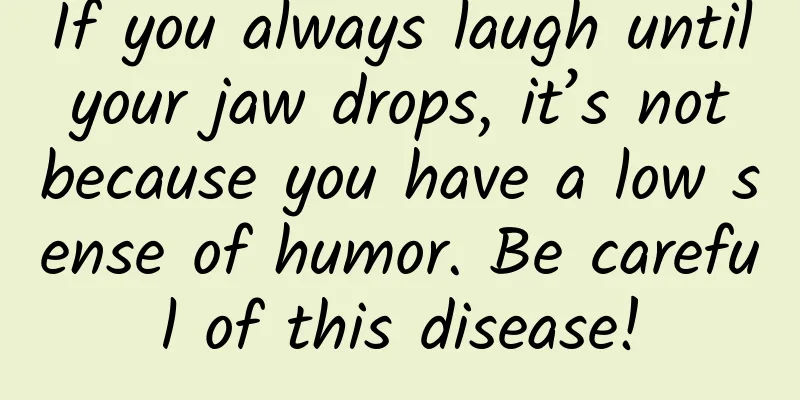If you always laugh until your jaw drops, it’s not because you have a low sense of humor. Be careful of this disease!

|
Have you ever laughed with your friends and suddenly found that your jaw couldn't close? Have you ever yawned with your mouth wide open and heard a clicking sound in front of your ears? If similar situations happen frequently, you should be alert to whether you have "temporomandibular joint disorder". Temporomandibular disorders (TMD) are one of the common diseases of the oral and maxillofacial region. It refers to a group of diseases with functional, structural and organic abnormalities in the temporomandibular joint and the surrounding masticatory muscles. It is caused by a variety of factors, including mental factors, social and psychological factors, occlusal dysfunction, trauma, minor trauma, immunity, sleep disorders, systemic and local diseases, etc. It is common in the 20-40 age group, and the prevalence rate in women is significantly higher than that in men. What are the clinical symptoms of temporomandibular joint disorder? (1) Pain: Pain in the jaw, temporal area, ear, or in front of the ear, often occurring when opening the mouth and chewing. (2) Abnormal joint noises: Clicking, popping, and snapping sounds are heard when the joints open and close. (3) Limited opening and closing of the mouth: symptoms of getting stuck when opening the mouth, or difficulty closing the mouth when opening it wide, sometimes requiring manual reduction, often accompanied by joint pain. (4) Others: A few are accompanied by headache, tinnitus, dizziness, and even shoulder and neck pain. If the above symptoms occur, what examinations are generally needed? (1) Medical history record: The doctor will ask in detail about the time, nature, location and degree of the relevant symptoms, including pain, clicking or mandibular movement disorder. (2) Oral examination: Check the condition of the dentition, the presence of periodontal lesions, the range of mandibular movement, and the degree of passive mouth opening. (3) Auxiliary examinations: including X-ray examination, computer-assisted tomography (CT/CBCT), magnetic resonance imaging (MRI), arthrography, etc. What are the treatments for a diagnosis of temporomandibular joint disorder? (1) Drug treatment: For patients with pain symptoms, non-steroidal anti-inflammatory drugs can be taken. (2) Physical therapy: Traditional Chinese medicine massage and acupuncture, laser, transcutaneous electrical nerve stimulation therapy and pulsed electromagnetic field, etc. (3) Occlusal splint therapy: It can relieve joint pain or masticatory muscle pain symptoms and improve oral and maxillofacial function. (4) Joint cavity lavage/joint cavity injection therapy: It can have anti-inflammatory, decompression, and analgesic effects. (5) Surgical treatment: minimally invasive arthroscopic surgery and open surgery. How to prevent temporomandibular joint disorder? (1) Avoid opening your mouth excessively, such as when laughing or yawning. (2) Keep your mouth clean, avoid chewing on one side, and reduce chewing of hard food. (3) Keep your mind relaxed and eliminate tension. (4) Maintain a correct posture, do not support your chin frequently, and avoid squeezing your chin when sleeping. References: Fu Kaiyuan, Lei Jie. Advances in classification, diagnosis and treatment of temporomandibular joint disorders[J]. Stomatology, 2024, 44(1): 6-10. |
<<: Summer Wars: Say goodbye to the "buzzing" troubles, here are the mosquito repellent tips!
>>: The first-person perspective brings you an immersive experience of normal childbirth
Recommend
Can I use a fan after I finish my confinement?
Summer is extremely hot, so whether it is air con...
Wearing a corset for a long time will give you an hourglass figure?
There is such a magical product: 👚Wearing it, you...
Nipple changes during early pregnancy
Many mothers will feel some changes in their nipp...
What should an unmarried girl do if she has inflammation?
Women often think that gynecological inflammation...
What are the benefits of soaking your feet every night during menstruation?
As a girl, I think the most painful thing is the ...
Extending heating is beneficial for stroke prevention and control
Stroke is a major chronic non-communicable diseas...
What are the dangers of having mastitis?
The main symptoms of mastitis include breast pain...
What should I do if I have stomach pain due to endometriosis?
Speaking of endometriosis, I believe everyone is ...
Did you know? Opening the door can be fatal in serious cases. How can we prevent salmonella during the Chinese New Year?
Written by : Li Caihong, Workplace: Urumqi First ...
What is Polyovary Syndrome?
The harm of polyovary syndrome to women's bod...
The risk of colorectal cancer in the elderly continues to increase. Experts remind: It is crucial to change these bad habits
As the living standards of Chinese people gradual...
10 days pregnant, stomach pain
For expectant mothers who are just pregnant with ...
The hazards of candidal vaginitis should be taken seriously after reading this
If the disease of candidal vaginitis is mild, it ...
Nearly half of people don’t know they have high blood pressure! Don’t ignore these common symptoms →
Review expert: Peng Guoqiu, deputy chief physicia...
Special medicine for fishy smell of leucorrhea
Many women have a strong smell of vaginal dischar...









